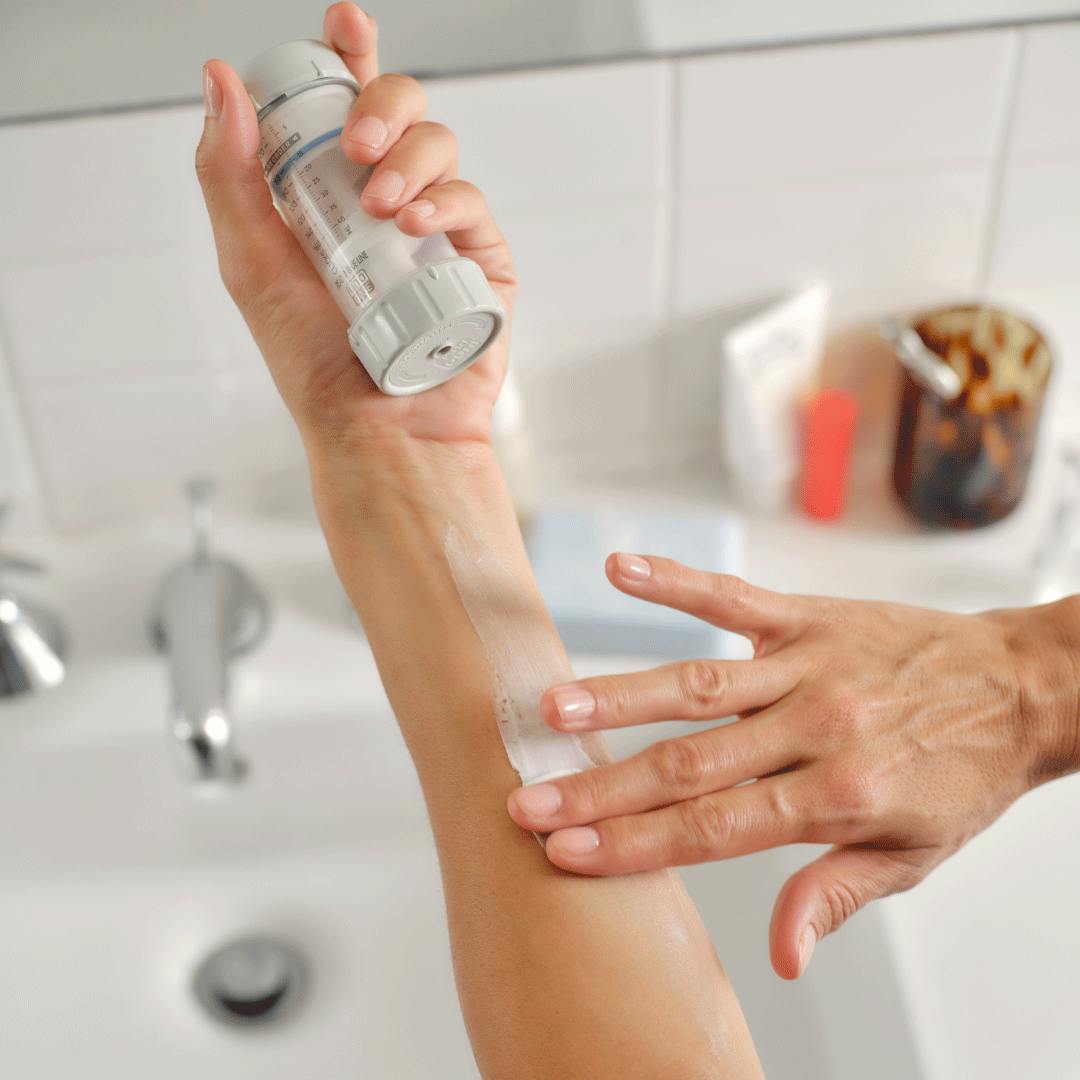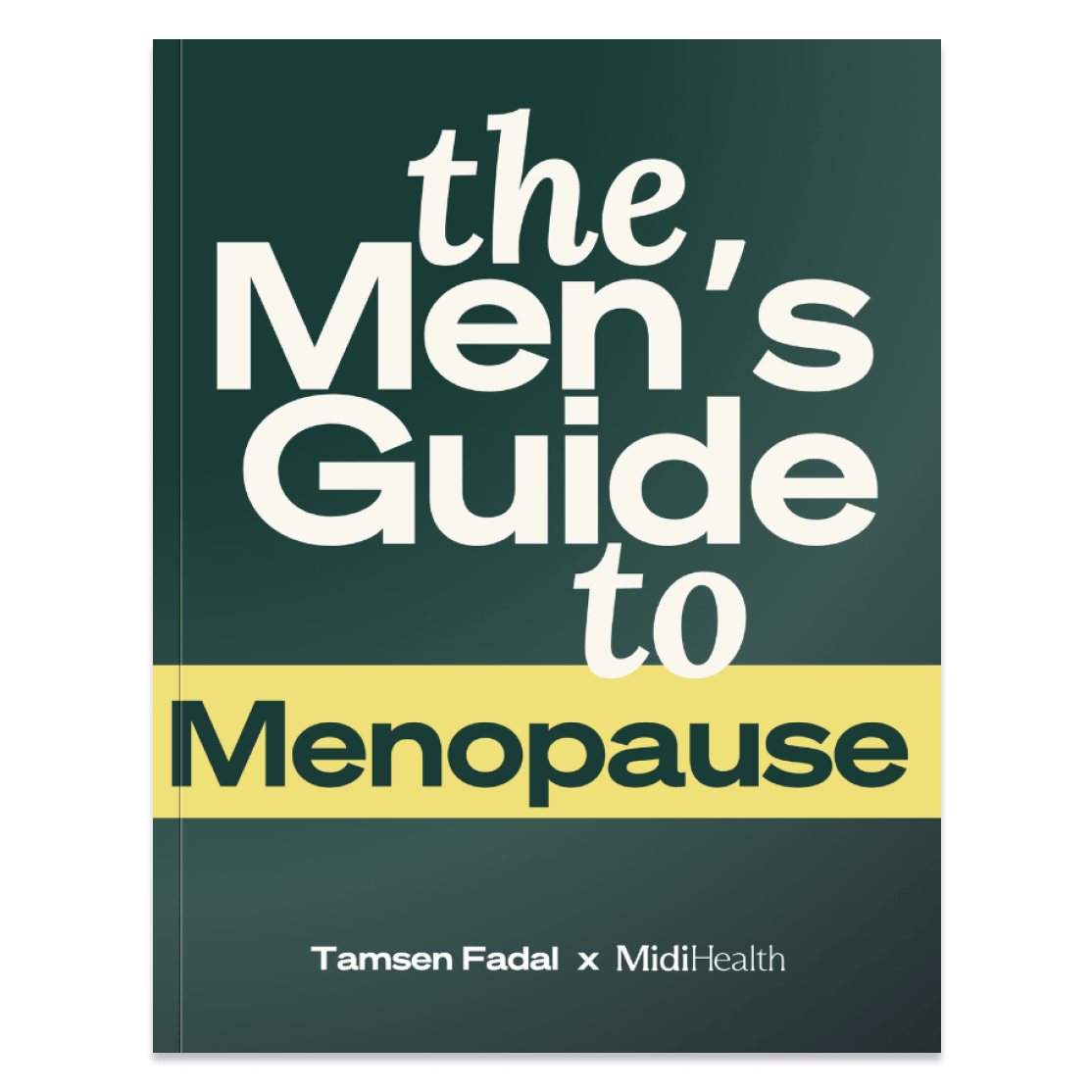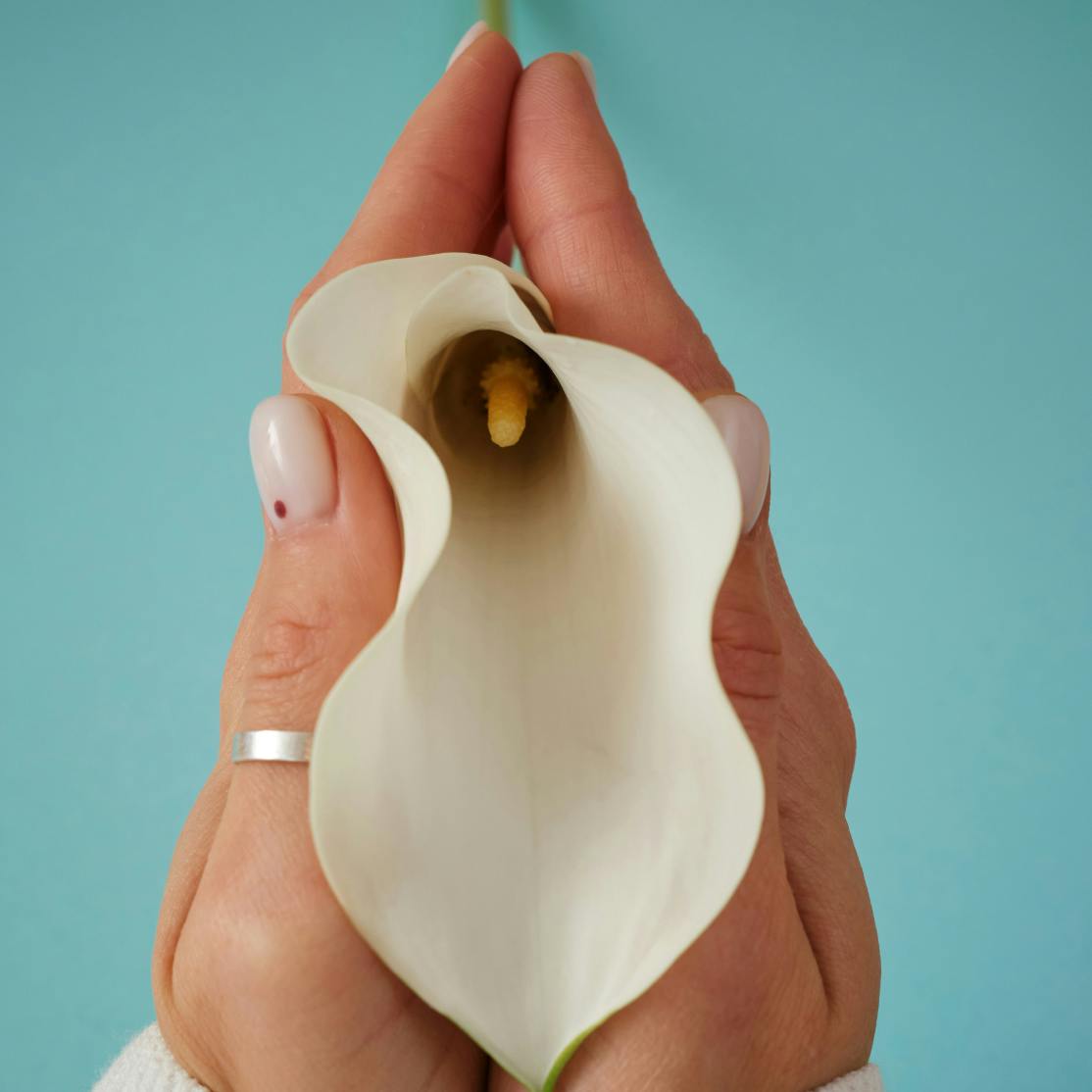Vaginal dryness is a common symptom of menopause, driven by declining estrogen levels that thin and dry out the vaginal walls. This can lead to discomfort, burning, itching, painful sex, and recurrent UTIs. Thankfully, there are effective treatments that address the root cause, helping restore comfort and confidence so you can feel like yourself again.
Vaginal dryness is one of those topics we should just talk about already, because more than half of all women experience it during the years leading up to and following menopause. The official name for this common symptom is vaginal atrophy (doctors, can we retire that awful term?) and the effects range from mild discomfort to serious pain. When coupled with other menopause realities like hot flashes, fluctuating mood, and poor sleep, vaginal dryness can make sex unappealing, if not impossible.
The first thing to know: You’re not alone. A study of 1,000 postmenopausal women and their male partners found that 64 percent of women experienced pain during sex and 30 percent of couples cited vaginal discomfort as a main reason for stopping intercourse. Over time, this association between sex and pain can naturally quash sex drive. Low libido, in turn, may make vaginal dryness worse, since vaginal moisture levels are tied to arousal.
But relief is possible, and you absolutely do not need to settle for limited options in bed. Read on to learn more about the hormonal root of menopause-induced vaginal dryness and discover a range of solutions for relieving your symptoms, stat. It’s time to feel comfortable and confident—and start enjoying sex again.
Vaginal dryness and painful sex at midlife: What’s going on?
The estrogen connection
Here’s the hormonal play-by-play: Estrogen is the main hormone responsible for maintaining vaginal blood flow and lubrication, and keeping your vaginal walls elastic. It’s also directly linked to sex drive. When a woman hits perimenopause (the lead up to periods stopping), estrogen levels fluctuate dramatically, trending downward until reaching their lowest point at menopause.
When levels drop, tissue in both the vagina and the vulva becomes thinner, dryer, weaker, and prone to irritation. It’s not uncommon to experience irritation (think burning, itching, and throbbing) and even bleeding during and after sex because friction can create micro-tears in delicate, vulnerable vaginal tissue. Another un-fun fact: Irritation-prone vaginal tissue can also affect the urinary system and make you more prone to recurrent urinary tract infections, which can lead to additional pain during sex.
Other potential contributors
Beyond declining estrogen, other factors may play a role in vaginal dryness and cause painful sex. Some are more directly in your control than others, but simply being aware of your potential triggers can empower you. If you have any concerns, bring them up with your doctor or Midi clinician so they can help you come up with a customized Care Plan.
- Stress, depression, and anxiety. Mood changes that often come with menopausal hormone fluctuations may have two effects: first, they can lower your libido, and second, they may actually decrease blood flow to the vagina, which is needed for arousal and adequate lubrication.
- Selective serotonin reuptake inhibitors (SSRIs). This is one of the main classes of medications used to treat depression and anxiety brought on by menopausal hormone shifts, and SSRIs have been linked to lack of lubrication in women.
- Certain cold and allergy meds. These include antihistamines, and may dry out your vaginal tissue along with your nasal passages.
- Smoking cigarettes. Smoking is known to reduce blood circulation and it’s been shown to exacerbate the drying and thinning of vaginal tissue that happens during menopause.
- Certain cancer treatments. Chemotherapy and endocrine therapy suppress circulating estrogen levels and have been linked to vaginal dryness.
- Domestic violence, sexual assault, and trauma. Lots of evidence backs this up: Past sexual trauma and abuse can contribute to painful sex, and research shows that menopausal women with a history of abuse are also more likely to report vaginal dryness and pain with intercourse, along with other menopause symptoms.
7 ways to treat vaginal dryness (so you can feel comfortable in bed, and everywhere else)
1. Vaginal estrogen
Prescription vaginal estrogen is considered the most effective option for relieving vaginal dryness and irritation and has been shown to eliminate symptoms of vaginal atrophy in 80 to 90 percent of cases. Unlike vaginal moisturizers and lubricants, which temporarily ease irritation, vaginal estrogen gets to the root of the problem by directly supplying parched vaginal tissues with estrogen via a cream, suppository, or ring to improve blood flow and lubrication. Typically, estrogen creams and suppositories are inserted into the vagina several times per week, while the flexible rings are placed high up in the vagina and release a low dose of estrogen over the course of 90 days.
Vaginal estrogen is safe and effective for most women. Compared to hormone replacement therapy (HRT), vaginal estrogen delivers a smaller amount of estrogen straight to the source, so it has no systemic (or body-wide) effects that could potentially be dangerous to women with a history of certain cancers. In fact, a recent study found that use of vaginal estrogen for vaginal dryness, urinary problems, and decreased libido is safe among gynecological cancer survivors. According to the American Academy of Obstetricians & Gynecologists, women with a history of estrogen-dependent breast cancer who are unresponsive to non-hormonal treatments may consider certain formulations of topical estrogen.
2. Hormone replacement therapy (or HRT)
While vaginal estrogen directly targets the irritated tissue where it’s applied, HRT estrogen is delivered through pills, patches, and other formulations and circulates throughout your body. Research suggests HRT alleviates vaginal dryness in about 75 percent of cases, making it less effective than vaginal estrogen. For this reason, Midi clinicians sometimes recommend vaginal estrogen instead of HRT, or alongside it.
Keep in mind: HRT is still the most effective treatment for the vasomotor symptoms of menopause (hot flashes and night sweats) and it may have a beneficial effect on menopause-induced depressive symptoms, so it’s still a great option for many. But, because HRT is systemic rather than localized, it may not be an option for women with a history of certain cancers.
Wondering if HRT could be the right option for you? At Midi, our clinicians can expertly guide you through the treatment options that can help you treat your perimenopause and menopause symptoms. Whether you have a complicated health history, need all the info on HRT before you begin, or want to explore non-hormonal options, we can help you find the right treatment.
3. Vaginal moisturizers
Vaginal moisturizers are available without a prescription and can help soothe pain, reduce irritating friction, and improve tissue by adding much needed moisture around and inside the vagina. There are two types: Vaginal moisturizers which are inserted into the vagina (often as a suppository) and external moisturizers, applied to the vulva. Typically, these are recommended for use every few days to help keep tissues hydrated and healthy.
4. Vaginal lubricants
Using a lubricant during sex can curb the friction that’s rough on vaginal tissue. Stick to water-based lubricants if you’re using condoms, since oil-based lubricants can break down latex. If condoms aren’t an issue, coconut oil is a nice natural option with skin-soothing benefits.
5. Sex toys
Yes, you read that right. If anxiety, self-consciousness, or arousal issues are contributing to your vaginal dryness and low libido, sex toys (used with lube, of course) can be a great way to find out what turns you on at this stage in your life—and to start associating sex with fun and pleasure again! They can also boost vaginal blood flow, which is essential for keeping things lubricated.
6. Therapy or couples counseling
If you’ve experienced trauma, past abuse, or are in a relationship where communication about sex is strained, options including couples counseling or sex and relationship therapy could help. Midi’s care coordination team can refer you to appropriate practitioners when you’re ready.
7. Healthy lifestyle and nutrition habits
While studies are few and far between when it comes to eating for vaginal health, omega-3 fish oil supplements show some promise and are considered safe for most people. In one study, supplementing with an omega-3 fish oil supplement—both alone and when combined with vitamin D—increased levels of estradiol, a form of estrogen that drops during menopause. And other research has found that a higher intake of omega-3s compared to monounsaturated fats was associated with fewer urogenital symptoms, which includes vaginal dryness, burning, itching, and irritation.
At Midi, we believe women deserve to feel great at every age and stage. So if vaginal dryness and irritation are interfering with sex—or any other element of your life—it’s time to get help. Midi clinicians will talk through all of your menopause symptoms and the solutions out there, including vaginal estrogen, HRT, mind-body therapies, nutritional supplements, or a combination of these, to come up with the right approach for you. We’ll work the problem together, until you feel better.
The Takeaway
- The hormone estrogen plays many roles, including helping to keep the skin of your vagina and vulva lubricated, thick, and elastic.
- For many women, the gradual drop in estrogen that happens in perimenopause and menopause can cause the vaginal walls to become thin, dry, and prone to irritation.
- Vaginal dryness can lead to varying degrees of discomfort, and it’s not uncommon for women to experience painful sex along with burning, itching, and recurrent UTIs.
- But here’s the thing: There are multiple ways to treat the root cause of vaginal dryness and help relieve discomfort, so you can fully enjoy sex, and your body, again.
If you’re in perimenopause or menopause and want guidance from clinicians who specialize in women’s midlife health, book a virtual visit with Midi today.
Hormonal change is at the root of dozens of symptoms women experience in the years before and after their period stops.
Our trained menopause specialists can help you connect the dots to guide you towards safe, effective solutions.
Whether you need personalized guidance or a prescription routine to tackle symptoms—including brain fog, hot flashes, sleep trouble, mood swings, and weight gain—we’ve got you covered. Learn more here.
Midi’s mission is to revolutionize healthcare for women at midlife, wherever they live and whatever their health story. We believe that starts with education, to help all of us understand our always-changing bodies and health needs. Our core values guide everything we do, including standards that ensure the quality and trustworthiness of our content and editorial processes. We’re committed to providing information that is up-to-date, accurate, and relies on evidence-based research and peer-reviewed journals. For more details on our editorial process, see here.



